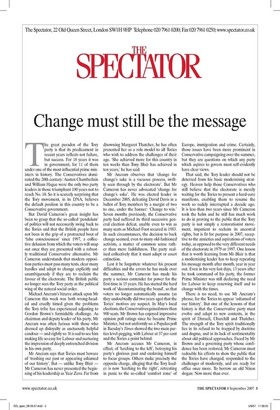Change must still be the message
The great paradox of the Tory party is that its predicament in recent years reflects not failure, but success. For 18 years it was in government, for 11 of them under one of the most influential prime ministers in history. The Conservatives dominated the 20th century: Austen Chamberlain and William Hague were the only two party leaders in those triumphant 100 years not to reach No. 10. So it is scarcely surprising that the Tory movement, in its DNA, believes the default position in this country to be a Conservative government.
But David Cameron's great insight has been to grasp that the so-called 'pendulum' of politics will not necessarily swing back to the Tories and that the British people have not been in the grip of a protracted bout of 'false consciousness' since 1997, a collective delusion from which the voters will snap out once they are presented with a robustly traditional Conservative alternative. Mr Cameron understands that modern opposition parties must pass many tests, clear many hurdles and adapt to change explicitly and unambiguously if they are to reclaim the favour of the electorate. The British public no longer sees the Tory party as the political wing of the natural social order.
Michael Ancram's bizarre attack upon Mr Cameron this week was both wrong-headed and cruelly timed given the problems the Tory tribe has experienced adjusting to Gordon Brown's formidable challenge. As chairman and deputy leader of his party, Mr Ancram was often furious with those who dressed up disloyalty as unctuously helpful candour — and rightly so. It is sad to see him making life so easy for Labour and nurturing the impression of deeply entrenched division in his own party.
Mr Ancram says that Tories must beware of 'trashing our past or appearing ashamed of our history'. But — unlike Tony Blair — Mr Cameron has never presented the beginning of his leadership as Year Zero. Far from disowning Margaret Thatcher, he has often presented her as a role model to all Tories who wish to address the challenges of their age. 'She achieved more for this country in ten weeks than Tony Blair has achieved in ten years,' he has said.
Mr Ancram observes that 'change for change's sake is a vacuous process, swiftly seen through by the electorate'. But Mr Cameron has never advocated 'change for change's sake'. He was elected leader in December 2005, defeating David Davis in a ballot of Tory members by a margin of two to one, under the banner: 'Change to win.' Seven months previously, the Conservative party had suffered its third successive general election defeat, unable even to win as many seats as Michael Foot secured in 1983. In such circumstances, the decision to back change seemed, even to many old-fashioned activists, a matter of common sense rather than mere faddishness. The party realised collectively that it must adapt or court extinction.
Lest it be forgotten: whatever his present difficulties and the errors he has made over the summer, Mr Cameron has made his party a serious contender for power for the first time in 15 years. He has started the hard work of 'decontaminating the brand', so that voters no longer automatically assume (as they undoubtedly did two years ago) that the Tories' motives are suspect. In May's local elections, the Conservatives gained more than 900 seats. Mr Brown has enjoyed impressive opinion poll ratings since he became Prime Minister, but not uniformly so: a Populus poll in Tuesday's Times showed the two main parties level-pegging, with Labour at 37 per cent and the Tories a point behind.
Mr Ancram accuses Mr Cameron, in effect, of 'lurching to the left', betraying his party's glorious past and enslaving himself to focus groups. Others make precisely the opposite charge, alleging that the Tory leader is now 'lurching to the right', retreating in panic to the so-called 'comfort zone' of Europe, immigration and crime. Certainly, those issues have been more prominent in Conservative campaigning over the summer, but they are questions on which any party which aspires to govern must self-evidently have clear views.
That said, the Tory leader should not be deterred from his basic modernising strategy. Heaven help those Conservatives who still believe that the electorate is merely waiting for the Tories to present a hard-core manifesto, enabling them to resume the work so rudely interrupted a decade ago. It is less than two years since Mr Cameron took the helm and he still has much work to do in proving to the public that the Tory party is not simply a restorationist movement, impatient to reclaim its ancestral rights, but is fit for purpose in 2007, receptive to the anxieties and aspirations of voters today, as opposed to the very different needs of the electorate in 1979 or 1997. One lesson that is worth learning from Mr Blair is that a modernising leader has to keep repeating his message month after month, year in year out. Even in his very last days, 13 years after he took command of his party, the former Prime Minister was still declaring the need for Labour to keep renewing itself and to change with the times.
There is no need, to use Mr Ancram's phrase, for the Tories to appear 'ashamed of our history'. But one of the lessons of that history is that the Conservative party must evolve and adapt to new contexts, in the spirit of Disraeli, Churchill and Thatcher. The strength of the Tory spirit traditionally lies in its refusal to be trapped by doctrine and dogma, and in its lack of sentimentality about old political approaches. Faced by Mr Brown and a governing party whose confidence has been restored, Mr Cameron must redouble his efforts to show the public that the Tories have changed, responded to the challenges of modernity, and are ready for office once more. To borrow an old Nixon slogan: Now more than ever.



































































 Previous page
Previous page